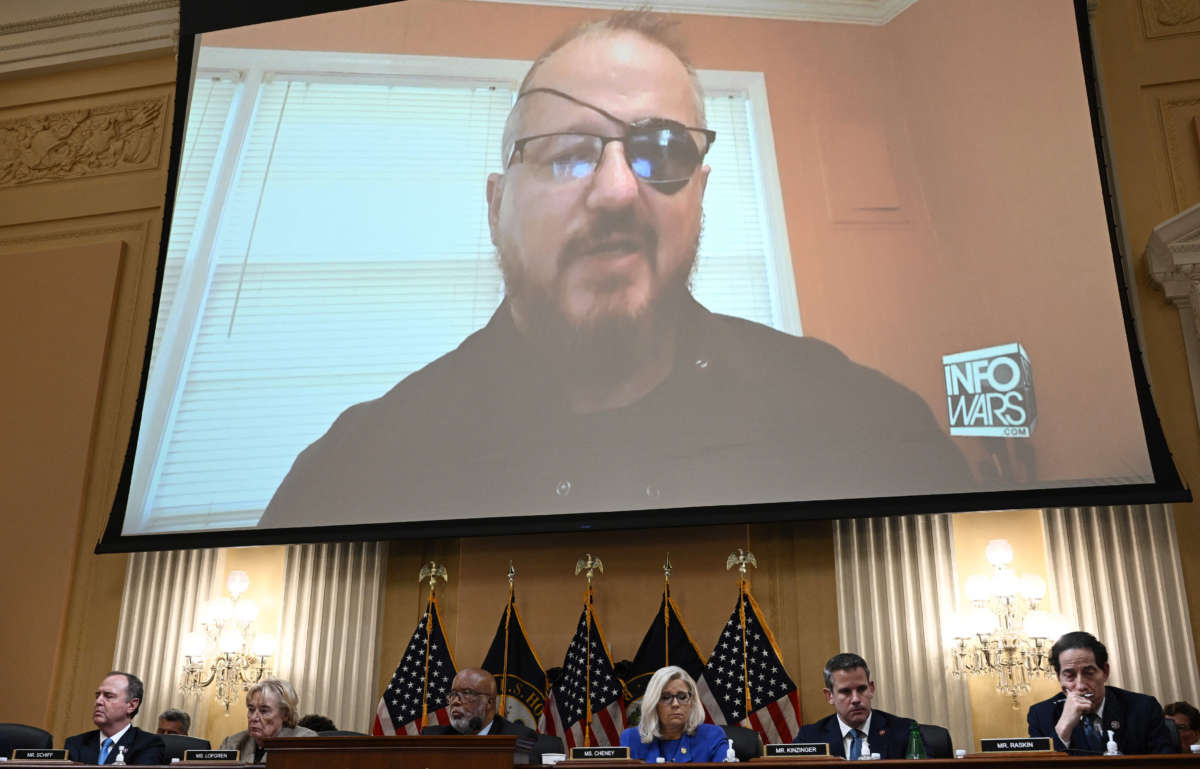Support justice-driven, accurate and transparent news — make a quick donation to Truthout today!
A federal jury in Washington D.C. has convicted two members of the far right Oath Keepers — including founder Stewart Rhodes — of seditious conspiracy for their involvement in the attack on the U.S. Capitol building on January 6, 2021, and for their attempts to overturn the results of the 2020 presidential election.
Three other members of the group were also convicted of obstruction of an official proceeding in Congress, but were found not guilty of seditious conspiracy. Both Rhodes and Kelly Meggs, the other member of the group who was convicted of seditious conspiracy, also received guilty verdicts related to disrupting an official proceeding.
Rhodes’s attorney said he plans to appeal the ruling, and a sentencing date has not yet been set. If upheld, Rhodes could face up to 20 years in prison for the seditious conspiracy conviction alone. The last successful seditious conspiracy conviction was nearly 20 years ago, in 1995.
Prosecutors in the case portrayed members of the Oath Keepers as feeling a “sense of entitlement” after Trump’s loss to President Joe Biden in the 2020 presidential election. That attitude led them to believe they could overturn the will of the American people, the prosecution said.
“They claimed to wrap themselves in the Constitution. They trampled it, instead. They claimed to be saving the Republic, but they fractured it, instead,” Assistant U.S. Attorney Jeffrey Nestler said during closing arguments.
Rhodes and others spouted violent rhetoric as they stormed the Capitol building — including suggesting that Trump’s loyalists attack Speaker of the House Nancy Pelosi (D-California).
Indeed, in a recording made days after the January 6 attack, Rhodes lamented that he and other Oath Keepers hadn’t employed more violence in order to keep Trump in power.
“My only regret is they should have brought rifles,” Rhodes said in the recording, which was obtained by the FBI and played to jurors by the DOJ. “We should have brought rifles. We could have fixed it right then and there. I’d hang fucking Pelosi from the lamppost.”
Some legal experts believe that Rhodes’s conviction indicates that similar charges could be levied against other key players in the January 6 attack— including former President Donald Trump. The DOJ is currently investigating Trump’s actions that day, and could feasibly move to charge him with a crime if evidence suggests that a case could be successful.
A direct connection between Rhodes’s actions and the former president hasn’t been established, although Rhodes did try several times to reach out to Trump to encourage him to take illegal actions to stay in power — including seizing voting machines to “prove” the election had been rife with fraud.
Notably, neither Trump nor Rhodes were inside the Capitol when the violence unfolded. The Oath Keepers’ founder was on the grounds of the Capitol building but not inside, directing other members who were in the Capitol while the violence erupted, and still received a seditious conspiracy conviction.
Lawmakers and commentators have asserted that Trump bears some legal responsibility for the violence that took place that day, since he directed a crowd of his loyalists — with full knowledge that some were armed with weapons — to express their complaints directly to Congress, ordering them to march to the Capitol that morning during a speech at his “Stop the Steal” rally. Former U.S. Attorney Barb McQuade has said that manslaughter charges for Trump should be considered.
Following Rhodes’s conviction on Tuesday, legal and political commentators hinted that the DOJ should consider charging Trump with seditious conspiracy.
“Stewart Rhodes being convicted for seditious conspiracy will be a wake-up call for a LOT of other January 6 defendants,” said lawyer Tristan Snell. “If the PLANNERS of January 6 can be convicted — and not just the foot soldiers — then EVERYONE involved is now at risk of serious felony convictions.”
Former FBI assistant director Frank Figliuzzi made a similar observation in a tweet directed at special counsel Jack Smith, who is overseeing the DOJ investigations involving Trump. Figliuzzi did not use Trump’s name in the tweet, but it was clear to whom he was referring.
“Dear Jack Smith; Someone can be charged and convicted for seditious conspiracy even when they weren’t there,” Figliuzzi said.
A terrifying moment. We appeal for your support.
In the last weeks, we have witnessed an authoritarian assault on communities in Minnesota and across the nation.
The need for truthful, grassroots reporting is urgent at this cataclysmic historical moment. Yet, Trump-aligned billionaires and other allies have taken over many legacy media outlets — the culmination of a decades-long campaign to place control of the narrative into the hands of the political right.
We refuse to let Trump’s blatant propaganda machine go unchecked. Untethered to corporate ownership or advertisers, Truthout remains fearless in our reporting and our determination to use journalism as a tool for justice.
But we need your help just to fund our basic expenses. Over 80 percent of Truthout’s funding comes from small individual donations from our community of readers, and over a third of our total budget is supported by recurring monthly donors.
Truthout has launched a fundraiser, and we have a goal to add 231 new monthly donors in the next 48 hours. Whether you can make a small monthly donation or a larger one-time gift, Truthout only works with your support.
